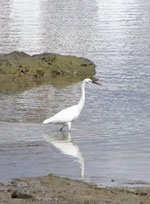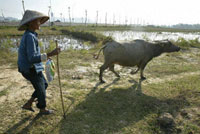




HONG KONG—Xing Yiqian used to drive around in luxury limousines, stay in five-star hotels, and live a playboy lifestyle along with his newly rich Chinese peers. Now he lives penniless near a beautiful lake surrounded by rainforest and teeming with waterfowl—a rare natural habitat his millions helped to restore.
"As soon as I hear the sound of the chainsaw, that they use to cut down trees, I feel unwell for the rest of the day," Xing, who remains committed to protecting the environment in which he grew up despite his bankruptcy, told RFA's Mandarin service
Xing, who made his U.S. $24 million fortune in the southern Chinese property boom of the early 1990s, began as a farm boy herding water buffalo by peaceful Egret Lake near his home village of Mingrenshan, on the southern island province of Hainan.
As soon as I hear the sound of the chainsaw, that they use to cut down trees, I feel unwell for the rest of the day.
On his way to the big time, he worked on construction sites, washed dishes in Hong Kong restaurants, and traded garments from city to city, living out of a briefcase.
Through years of hardship, a single image kept him going: the memory of the egrets on the sparkling waters of the lake and the deep green shade of the surrounding forest.
"Egret Lake used to be surrounded by virgin forest," Xing told RFA's Investigative Report. "I used to take the water buffalo down there when I was a boy. There were a lot of water birds there, right close to my house."

"But when I went back, all the birds had gone. My idea was quite simple—to restore the place to the way it used to be."
With much of coastal China driven by breakneck economic growth, and the poorer areas of the country struggling desperately to make ends meet, the concept of forgoing instant, ready cash for a vague promise of environmental improvement didn’t sit well with Mingrenshan villagers.
Xing started out by paying the chainsaw-toting and gun-wielding villagers not to cut down trees or shoot birds, compensating them for the income they so desperately needed. In the process, he earned himself the nickname of Boss Qian, a pun on his given name, which sounds like the Chinese word for money.
In total, Xing poured around seven million yuan (U.S.$846,000) into his local village, eventually setting up a government-approved nature reserve to protect the egrets and other water birds, and transplanting massive old trees that provide nesting sites for egrets.
"At first it was very difficult because we didn't have much experience. We wanted to bring the unwanted trees to the lakeside, but there was no road there. So on the one hand we were building a road, to bring along a large truck and excavator. It cost a lot of money to have the tree moved, and then there was the road to pay for," Xing said, recalling the first time he transplanted a tree.

"The tree we were transporting was half rotten because it had already been pulled down. I thought to myself how big it was, what a wonderful tree. I thought we'd give it a try by the lake and see if it worked. It cost 10,000 or 20,000 yuan but we brought it back," he said.
"And from 1997 onwards, the birds started to come back to Egret Lake."
Some of Xing's investments were more philanthropic than environmental.
"He has put a lot of money into this place, on buildings, schools, maybe several hundred thousand yuan here, several hundred thousand there. A lot of money," an official at the nearby Donglu Township government told RFA reporter Bai Fan.
"He's very famous around here. Yes, it probably does amount to that much [millions]," the official said.
Xing spent four million yuan on buying trees alone. Meanwhile, all the time he was focusing on his environmental activities, his property business was going downhill, as the property bubble began to shrink in the mid- to late-90s.
He has put a lot of money into this place, on buildings, schools, maybe several hundred thousand here, several hundred thousand there.
With only occasional paying visitors to his Mingrenshan Nature Reserve, Xing's wife is currently washing dishes in a Hong Kong restaurant to keep their three children.
And while they welcomed Xing's largesse, which included giving cars to local officials, when he was a rich man—even giving him the key to the city—local authorities haven’t responded to his requests for a loan to continue his environmental work now that times are harder.
"The investment amount he was looking at was too much for us. We really don't have those sorts of funds here at the township," the Donglu Township official told RFA. "The local authorities here, even in the city of Wenchang, basically haven't had that kind of money in the last five years. They have no income."
Nonetheless, Xing says he doesn't regret his move into environmental protection and still believes preservation and development can go hand-in-hand.
He says he has been well repaid by the nature reserve itself, which has rewarded him with a rapidly regenerating forest and more than 10,000 birds in the years since 1997.
Xing recalls a moment at a locally organized activity day by the lake, when he got up to address the crowd of several thousand.
Just as I was about to get up to speak in front of thousands of people, all the egrets flew out from the trees and circled above our heads for a very long time, calling out. It sounded as if they were praying for something.
"I didn't have a penny to my name, but just as I was about to get up to speak in front of thousands of people, all the egrets flew out from the trees and circled above our heads for a very long time, calling out. It sounded as if they were praying for something."
"A lot of people said it was strange and inexplicable, because usually if there are a lot of people around the birds don't come out. But this time they flew around our heads for a long time out on the peninsula, from the woods in all directions," Xing said.
And while local residents initially had little comprehension of Xing's approach, his philosophy may have rubbed off on some local residents, who now inhabit a picturesque village at the heart of a nature reserve.
"When you arrive at our village, you have to walk through the trees before you realize that there really are that many houses here," Xing said.
Another Mingrenshan villager agreed. "It's lovely here. Very beautiful," she said.